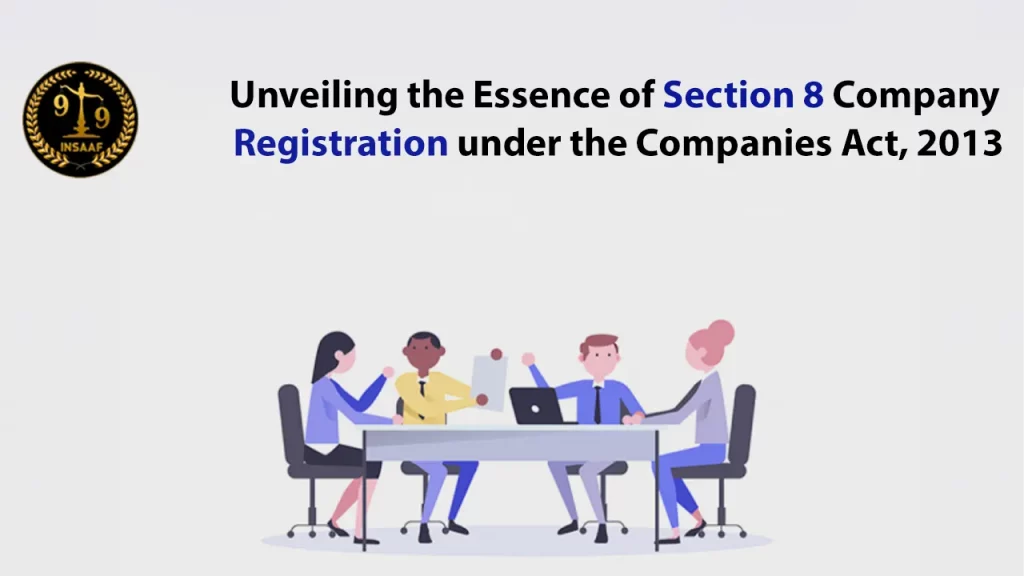

Online Legal Advice from Insaaf99® Online Lawyer Consultation in India


Online Legal Advice from Insaaf99® Online Lawyer Consultation in India

Enacted through the Company Registration Act of 2013, Section 8 Company are specialized entities tailored for non-profit organizations (NPOs) in India. As companies without share capital, they are expressly designed to advance charitable and social objectives, excluding any profit distribution among shareholders.
These entities are conceived with a singular purpose to champion charitable and social causes, distinctly devoid of any profit-sharing motives among stakeholders. Governed by Section 8 of the Companies Act, these entities uniquely blend philanthropy with entrepreneurship, holding a distinctive position in corporate governance.
Section 8 of Companies Act 2013, regulates the establishment and operations of not-for-profit entities, specifically Section 8 companies. These organizations are characterized by their dedication to charitable or philanthropic endeavors, ensuring that any generated profits are redirected towards societal welfare rather than being distributed among members.
Non-profit Orientation: Section 8 companies are obligated to channel their profits and other income exclusively toward the advancement of charitable objectives. This non-profit orientation distinguishes them from other corporate entities, aligning their mission with social welfare and community development.
Limited Liability: Similar to other corporate structures, Section 8 companies provide limited liability to their members. This shields the personal assets of members from the company's liabilities, fostering a conducive environment for philanthropic endeavors.
Exemptions and Privileges: Section 8 companies enjoy certain exemptions and privileges, such as reduced fees for various statutory compliances. These companies enjoy tax exemptions and deductions under the Income Tax Act, 1961, making them financially attractive for charitable endeavors.
Corporate Structure: Section 8 companies adopt a corporate structure, offering greater transparency and accountability in their operations.
Also Read: - Understanding Punishment Under Section 34 IPC: Bailable or Non-Bailable?
Name Approval: Commences with selecting and securing approval for a distinctive name, reflecting the charitable objectives and avoiding similarity with existing entities.
MOA and AOA Drafting: Preparation of Memorandum of Association (MOA) and Articles of Association (AOA) in compliance with the prescribed format, outlining the company's objectives and governing principles.
Application Filing: Submission of the registration application, including necessary documents, detailing directors, registered office, and other essential particulars.
License Procurement: Post-application scrutiny, the RoC issues a crucial license under Section 8 of the Companies Act, 2013, signifying the entity as a Section 8 company.

After registration, Section 8 companies must adhere to specific compliance requirements:
Maintenance of Books of Accounts: Ensure proper upkeep of books of accounts and financial records to uphold transparency in financial operations.
Filing of Annual Returns: File annual returns with the Registrar of Companies (ROC), offering a comprehensive overview of financial performance and activities.
Compliance with Income Tax Regulations: Adhere to the provisions of the Income Tax Act, 1961, and fulfill tax filing obligations as applicable.
Section 8 companies are pivotal in addressing social issues and fostering community welfare. By directing resources toward education, healthcare, poverty alleviation, and environmental conservation, these entities become agents of positive change.
Educational Initiatives: Section 8 companies often promote education through the establishment of schools, vocational training centers, and scholarship programs. This aligns with the overarching goal of empowering individuals through knowledge and skill development.
Healthcare Interventions: Charitable healthcare initiatives, including clinics, medical camps, and awareness programs, are common endeavors of Section 8 companies. They contribute to enhancing the health and well-being of underserved communities.
Environmental Sustainability: Some Section 8 companies actively participate in environmental conservation projects, advocating for sustainable practices, afforestation, and effective waste management. Their efforts contribute to a healthier planet for current and future generations.
Concluding Words: Inclusive Governance: The Role of Section 8 Companies in Fostering Positive Change in Society
In conclusion, Section 8 companies, authorized under the Companies Act, 2013, serve as a beacon of hope and progress in the realm of non-profit organizations in India. These entities, seamlessly blending the principles of entrepreneurship with a steadfast commitment to social welfare, have emerged as catalysts of positive transformation.
By embracing the intricacies of corporate governance, Section 8 companies stand as a testament to the transformative power of collective action and unwavering dedication to the betterment of society.
Their invaluable contributions in fostering a more equitable and compassionate world are commendable and deserving of our utmost recognition.
Insaaf99, your online legal companion, facilitates the establishment of Section 8 companies under the Companies Act, 2013, through:
Expert Guidance: Insaaf99 provides access to legal experts well-versed in the nuances of Section 8 company registration, offering personalized guidance and solutions.
Seamless Consultation: The platform facilitates easy and efficient online consultations, ensuring that aspiring philanthropists can have their queries addressed promptly and comprehensively.
Document Assistance: Insaaf99 streamlines the documentation process, guiding users through the drafting of essential documents such as the Memorandum of Association (MOA) and Articles of Association (AOA).
Step-by-Step Support: As users navigate the registration process, Insaaf99 offers step-by-step assistance, demystifying complex legal procedures and ensuring compliance with regulatory requirements.
Real-time Updates: Stay informed with real-time updates on the status of your registration application, keeping you in the loop throughout the entire process.
Insaaf99 simplifies the journey of socially conscious entrepreneurs, ensuring a smooth and legally compliant Section 8 company registration process.